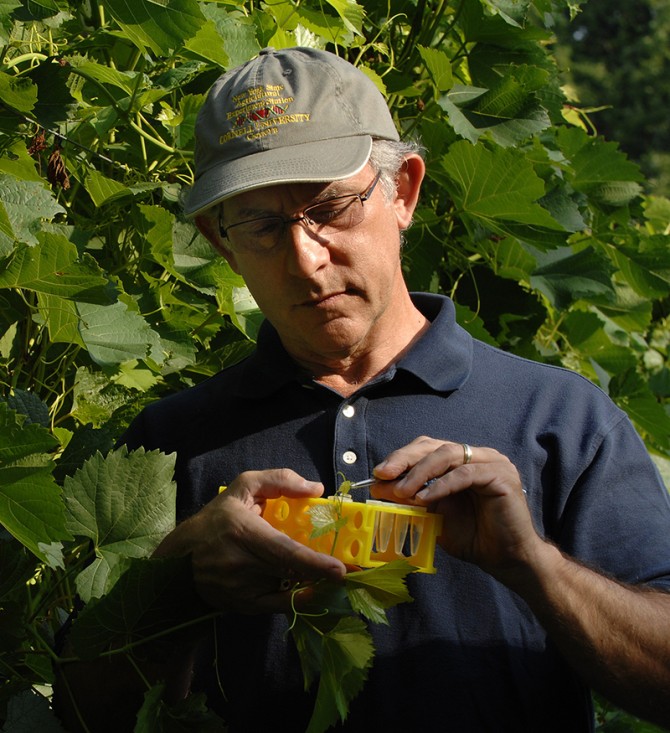Cornell-led project to improve grapes gets big boost
By David Nutt
Breeding the next great grape is getting a boost thanks to new funding for a Cornell-led project that uses genomic technology to create varieties that are more flavorful and sustainable.
The project, VitisGen2, is a collaboration of 25 scientists from 11 institutions who are working in multidisciplinary teams to accelerate development of the next generation of grapes. Launched in 2011, the project was recently renewed with a $6.5 million grant from the U.S. Department of Agriculture’s National Institute of Food and Agriculture, Specialty Crop Research Initiative.
The work has the potential to save millions of dollars annually for the U.S. grape industry – in excess of $100 million in California alone, according to Bruce Reisch, professor of grapevine breeding and genetics in the College of Agriculture and Life Sciences (CALS), who co-leads the project with Lance Cadle-Davidson, plant pathologist with the USDA-ARS Grape Genetics Research Unit, both located at Cornell’s New York State Agricultural Experiment Station in Geneva, New York.
VitisGen2’s multipronged model addresses the grape production continuum. An economics team examines the benefits of improving grape varieties. Geneticists identify molecular markers for important traits in grapes, from resistance to diseases like powdery mildew to boosting low-temperature tolerance and fruit quality. Grape-breeding scientists develop new grape varieties that incorporate these traits, and teams of outreach specialists help growers and consumers understand the advantages of newly introduced grape varieties.
The result is a new generation of high-quality grapes that can be grown at lower cost and adapt easily to a range of geographic regions and climates, all with less environmental impact.
“We all stand to benefit in areas ranging from the environment to economic sustainability to improving the profit and quality possibilities for the industry,” Reisch said.
Among the achievements in the project’s first five-year phase:
- Deploying DNA sequencing technology to map the grape genome, a project led by Cadle-Davidson and Qi Sun of the Cornell Bioinformatics Facility.
- Identifying 75 genetic markers associated with a range of important traits.
- Pinpointing a gene that controls acidity in grapes. The discovery by the winemaking fruit quality team, led by Gavin Sacks, associate professor of food science in CALS, will help winemakers moderate excessive acid levels typically found in wild grape species, which are often used in crossbreeding for their resistance to disease.
- Developing a process called Amplicon Sequencing, or AmpSeq, that allows researchers to rapidly analyze genetic variation in multiple genomic regions – anywhere from 2 to 500 DNA sequence markers – simultaneously.
The project has already shared its disease-resistant germplasm with breeding programs throughout the U.S., speeding the development of grape varieties with more flavor and that are more environmentally sustainable.
Looking to the future, Reisch and the VitisGen2 teams are aiming to expand the use of high-throughput DNA and plant evaluation technology to improve the quality of wine, raisin and table grapes, as well as rootstocks. VitisGen2 is using genome sequencing to identify markers within numerous genes of interest to better understand which genes are controlling priority traits.
The team is also looking at ways to use its collective knowledge of genetics to help growers manage vineyards. For example, AmpSeq technology can track the powdery mildew pathogen population, allowing researchers to determine which pesticides are most effective at specific times of the season, thereby reducing pesticide spraying and increasing its efficacy.
Ultimately, VitisGen2 will bring greater efficiency to grape growing, which is an intensive, comprehensive and costly process, said Reisch.
“It takes 15-plus years to get a new variety to the market,” Reisch said. “We’re probably shrinking the timeline down by two or three years.”
David Nutt is a freelance writer for the College of Agriculture and Life Sciences.
Media Contact
Get Cornell news delivered right to your inbox.
Subscribe